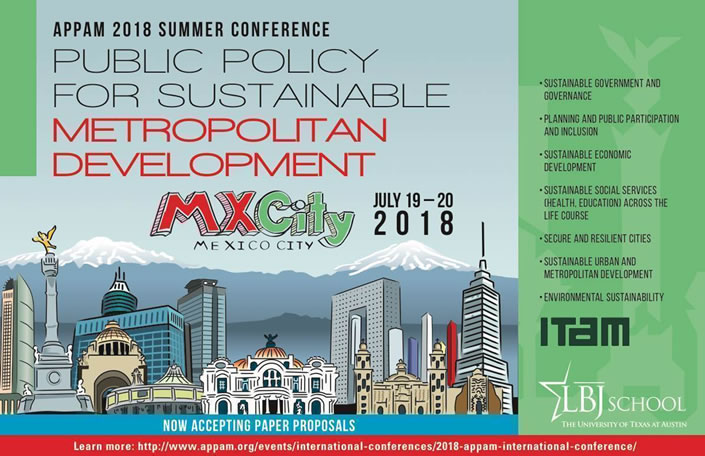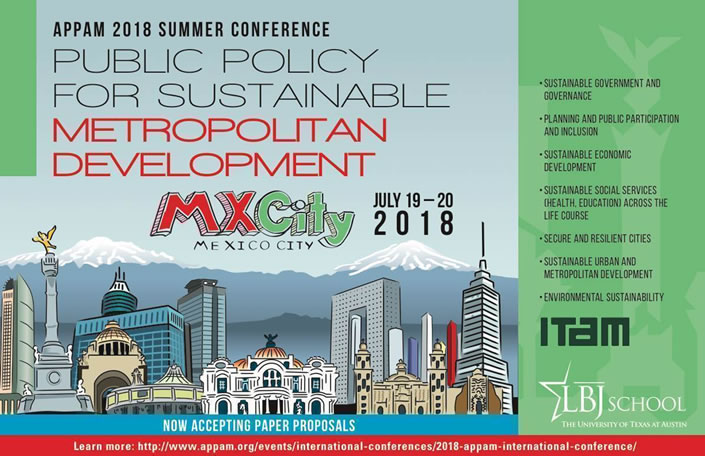Podrá encontrar mayor información en el siguiente enlace:
http://www.appam.org/events/international-conferences/2018-appam-international-conference/
Nota: Información, ponencias y contenidos en inglés.
American Association for Public Policy Analysis and Management (APPAM)
Annual International Conference, Mexico City,
Thursday-Friday 19-20 July 2018
APPAM is the foremost association of Public Affairs and Management in the USA. Unlike APPAM’s Fall conference which attracts mostly US academics and policy makers, the annual summer international conference attracts participants from all over the world. Usually held in Europe or Asia, this is the first time that it is being held south of the border and, being located in Mexico, it is anticipated that it will be an attractive venue for visitors from Europe and Asia, as well as providing an opportunity to open up links between APPAM and Latin American public policy programs.
The LBJ School of Public Affairs at the University of Texas at Austin and the Instituto Tecnólogico Autónomo de México (ITAM) jointly have the honor to organize the 2018 International Conference which will be hosted by the ITAM at its attractive principal campus location in south-west Mexico City.
Located in one of the world’s largest metropolitan areas, the 2018 conference theme is: Public Policy for Sustainable Metropolitan Development, and comes some 18 months after the 2016 bi-decennial UN-Habitat III conference in Quito and the adoption of the «New Urban Agenda». The NUA presents a paradigm shift based on the science of cities and lays out standards and principles for the planning, construction, development, management, and improvement of urban areas along its five main pillars of implementation: national urban policies, urban legislation and regulations, urban planning and design, local economy and municipal finance, and local implementation. The NUA also incorporates the United nations 2015 sustainable development agenda that sets goals to end poverty, protect the planet, and ensure prosperity for all, embodied in 17 Sustainable Development Goals (SDGs). The SDGs propose specific targets to be achieved over the next 15 years and include inter alia: Poverty (#1), Good Health and Wellbeing (#3); Quality Education (#4); Clean Water and Sanitation (#6); Affordable and Clean Energy (#7); Decent Work and Economic Growth (#8); Sustainable Cities and Communities (#11); Climate Action (# 13), etc. For further details on the New Urban Agenda and SDGs and targets see:
https://habitat3.org/the-new-urban-agenda
http://www.un.org/sustainabledevelopment/sustainable-development-goals/
Both the «umbrella» conference theme, and the venue of Mexico City offer an excellent opportunity for a wide range of session papers and posters presentations relating primarily to sustainability in cities, especially those related closely to the SDGs. It will also be especially interesting coming two weeks after Mexico’s national and presidential elections.
Given the conference location in one of the World’s largest megacities we propose a metropolitan focus (albeit not exclusively so), with a «steer» towards larger cities, especially those with multi-jurisdictional governmental structures and governance challenges. Specifically, papers are invited for sessions that focus upon, or intersect with tracks within one or more of the following broad Policy Areas:
A) Sustainable Government (Possible panel sessions: i) Intergovernmental Relations (including rural-urban linkages); ii) Urban Governance; iii) Fiscal Policy and Sustainable Financial Management; v) Administrative Reform & Municipal Strengthening; vi) Sustaining Electoral Democracy; vii) Polices to Address Inequality; viii) NGOs and Philanthropic Orgs.; ix) Other)
B) Planning and Public Participation and Inclusion (Possible panel sessions: i) Sustainable planning & Metro Coordination; ii) Public Participation; iii) Rights to the City; iv) Cultural & Historical Heritage; v) Minorities and Identity; vi) Other
C) Sustainable Economic Development (Possible panel sessions: i) Labor Markets; ii) Informality; iii)Taxation; iv) Metropolitan employment policies; v) Sectoral Investments; vi) Immigration; vii) Natural disasters; viii) Other)
D) Sustainable Social Services Across the Life Course (Possible panel sessions: i) Education Policies and Child Development; ii) Social Services and Wellbeing; iii) Health Care; iv) Demographic Change Ageing; v) Other)
E) Secure Cities (Possible panel sessions: i) Food and Nutritional Security; ii) Policing and Public Safety; iii) Gang and Criminal Mitigation; iv) Disaster and Reconstruction; v) Metropolitan Criminal Justice; vi) Other)
F) Sustainable Urban and Metropolitan Development (Possible panel sessions: i) Transportation; ii) Housing and Land Markets; iii) Public Infrastructure; iv) Spatial Segregation/Displacement; v) Spatial Mobility Patterns; vi) Building Resilience; vii) Other)
G) Environmental Sustainability (Possible panel sessions: i) Renewable Energy; ii) Clean Energy; iii) Water Management; iv) Pollution Mitigation; v) Combating Climate Change; vi) Other)

